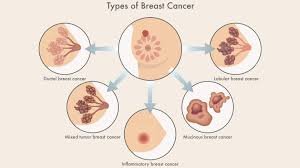[ad_1]
Cancer care experts have said that lifestyle changes in Nigeria and other low and middle-income countries could be one of the major factors fuelling the increasing incidence of breast cancer.
The oncologists noted that there has been an increasing incidence and mortality from breast cancer in Nigeria and other lower-resource countries over the past years, even though Nigeria and those countries have historically reported lower rates of breast cancer.
According to the oncologists, while approximately half of the breast cancers develop in women who have no identifiable risk factors other than being female and being over 40 years, the surge in breast cancer cases and its mortality has been linked to lifestyle changes.
They noted that breast cancer is undoubtedly the most common form of cancer afflicting women, adding that some common causes of breast cancer include a family history of it, being overweight, and excessive alcohol consumption.
Others, they said, include reproductive factors like late menopause, never having children, or having one’s first child after the age of 30.
They, however, stressed that breast cancer shouldn’t be a death sentence, noting that access to early and proper diagnosis, as well as treatment, could help reduce mortality from the health condition.
Speaking with The Punch, the experts, United Kingdom-based Clinical Oncologist and Clinical Fellow, Proton Beam Therapy, The Christie NHS Foundation Trust, Dr. Kenneth Oguejiofor, and another UK-based Consultant Medical Oncologist, University Hospitals of Leicester NHS Trust and Honorary Senior Lecturer, Leicester Cancer Research Centre, Dr. Olubukola Ayodele, said it has become necessary to address the factors fuelling the rise in the incidence of breast cancer particularly among black.
Dr. Oguejiofor noted that the breast cancer situation in Nigeria is not significantly different from those in other climes, especially as it relates to the causes, adding that the difference could be the better access to diagnosis and treatment in the developed countries.
He said, “The risk factors for cancers include environmental and genetics. It is almost impossible to change genetics. Environmental risk factors can, however, be modified. It is possible to embrace smoking cessation, reduce excess alcohol consumption, do regular exercise, and consume a balanced diet. It has also been suggested that perhaps proper breastfeeding can help reduce breast cancer risk so that can be encouraged.
“However, as our women live longer, they remain susceptible to cancers. That is why early detection makes it easier to cure. Screening programmes using mammograms for age-selected patients have been shown to reduce breast cancer mortality. Although, in our clime, there is no access to a national programme for breast cancer screening and breast self-examination. This programme is necessary as it can help in finding any abnormalities.”
Speaking in the same vein, Dr. Ayodele lamented the increasing mortality from breast cancer, noting that it has been confirmed to be the second most common cause of death from cancer among women after lung cancer.
She said, “There has been an increase in breast cancer incidence worldwide. Low and middle-income countries such as Nigeria have historically reported lower rates of breast cancer, but over the past twenty years, there is a trend of increasing incidence and mortality from breast cancer in these lower-resource countries.
“It is estimated that LMICs will be burdened with 45 per cent of breast cancer cases and 55 per cent of breast cancer-related deaths. The reason for this has been linked to lifestyle changes”.
She stated further that reproductive factors such as long menstrual history (early and late menopause), never having children (nulliparity), having one’s first child after the age of 30, and never breastfeeding, adding that they have all been linked to increased risk of developing breast cancer by women.
[ad_2]
Source link



